
Cannabis and its derivatives, including tetrahydrocannabinol (THC), have become a significant topic of discussion in the realms of medicine, wellness, and recreation. As more countries and states legalize cannabis, understanding the benefits and risks associated with THC consumption is crucial. This guide aims to provide a balanced perspective, helping consumers make informed decisions about incorporating THC into their lives.
What is THC?
THC, or delta-9-tetrahydrocannabinol, is the primary psychoactive compound found in cannabis. It is responsible for the “high” that many people associate with marijuana use. THC interacts with the endocannabinoid system (ECS) in the human body, primarily by binding to CB1 receptors in the brain and nervous system. This interaction can influence mood, perception, appetite, and other physiological and psychological processes.
The Benefits of THC Consumption
Pain Relief
One of the most well-documented benefits of THC is its ability to alleviate pain. It is particularly effective for chronic pain conditions such as arthritis, fibromyalgia, and neuropathy. THC works by interacting with the ECS to modulate pain signals, making it a popular alternative to traditional painkillers.
Nausea and Appetite Stimulation
THC has been widely used to combat nausea and vomiting, especially in patients undergoing chemotherapy. Additionally, it is known for its appetite-stimulating properties, often referred to as the “munchies,” which can be beneficial for individuals with conditions like HIV/AIDS or eating disorders.
Mental Health Benefits
For some, THC can provide relief from anxiety, depression, and post-traumatic stress disorder (PTSD). Its mood-enhancing properties can help reduce stress and promote relaxation. However, the effects can vary significantly depending on the individual and dosage.
Sleep Aid
THC is often used as a natural sleep aid. Its sedative effects can help individuals with insomnia or other sleep disorders achieve restful sleep.
Neuroprotective Properties
Emerging research suggests that THC may have neuroprotective qualities, potentially benefiting conditions like Alzheimer’s disease, Parkinson’s disease, and multiple sclerosis. These effects are thought to result from THC’s ability to reduce inflammation and oxidative stress in the brain.
The Risks of THC Consumption
Impaired Cognitive Function
One of the most immediate risks of THC consumption is its impact on cognitive abilities. Short-term effects may include impaired memory, difficulty concentrating, and altered judgment. Long-term use, especially in adolescents, can potentially lead to lasting changes in brain development.
Dependency and Addiction
While not as addictive as substances like alcohol or nicotine, THC can lead to dependency for some individuals. Frequent use can result in a condition known as cannabis use disorder (CUD), characterized by withdrawal symptoms, cravings, and continued use despite negative consequences.
Anxiety and Paranoia
Though THC can alleviate anxiety for some, it can exacerbate it for others. High doses, in particular, may lead to feelings of paranoia or panic, especially in individuals new to cannabis or those with a predisposition to mental health issues.
Respiratory Issues
Smoking cannabis can irritate the lungs and airways, leading to chronic bronchitis-like symptoms over time. While vaping or consuming edibles can mitigate this risk, they come with their own set of considerations.
Legal and Workplace Concerns
Despite increasing legalization, THC remains illegal in many regions. Additionally, its presence can be detected in drug tests, potentially causing issues in workplaces with strict drug policies.
Types of THC Products
With the evolving cannabis market, THC products are now available in various forms, catering to diverse consumer preferences. Here are some popular options:
Flower/Bud
The traditional method of consuming THC involves smoking or vaporizing cannabis flowers. This method provides rapid effects but may not be suitable for those concerned about respiratory health.
Edibles
THC-infused edibles, such as gummies, chocolates, and beverages, offer a discreet and smoke-free way to consume cannabis. However, they have a delayed onset time (30 minutes to 2 hours) and can lead to unintentional overconsumption.
Vapes
Vape cartridges and disposable pens are popular for their convenience and portability. Vaping delivers THC quickly but may pose risks associated with certain additives or overheating.
Tinctures and Oils
These products are administered sublingually (under the tongue) for fast absorption or added to food and drinks. Tinctures allow precise dosing, making them ideal for medical use.
Topicals
THC-infused creams, balms, and patches are designed for localized application, providing pain relief without the psychoactive effects.
Concentrates
Products like shatter, wax, and rosin contain high levels of THC and are used by experienced consumers seeking potent effects.
Tips for Safe THC Consumption
- Start Low and Go Slow: Beginners should start with low doses of THC and gradually increase as needed to avoid overwhelming effects.
- Choose the Right Method: Consider your goals and lifestyle when selecting a THC product. For example, edibles may be better for long-lasting effects, while vaping offers immediate relief.
- Be Mindful of Legalities: Ensure that THC consumption is legal in your region and adhere to local laws.
- Understand Your Tolerance: Everyone’s response to THC is unique. Pay attention to how your body reacts and adjust your consumption accordingly.
- Avoid Mixing with Alcohol: Combining THC with alcohol can amplify its effects and lead to increased impairment.
- Seek Medical Advice: If you’re using THC for medical purposes, consult a healthcare professional to determine the best approach.
The Future of THC Research
As cannabis legalization expands, research into THC and its effects continues to grow. Scientists are exploring its potential in areas such as cancer treatment, chronic pain management, and mental health therapies. Innovations in product development, such as nanoemulsion technology for faster absorption, are also on the horizon.
Conclusion
THC offers a range of benefits, from pain relief to mental health support, making it a valuable option for many individuals. However, it is not without risks, particularly concerning cognitive function, dependency, and legal implications. By understanding these factors and approaching THC consumption responsibly, individuals can enjoy its potential benefits while minimizing adverse effects.
Here’s my personal review of some of the THC products from Just Delta, and I’m excited to share my experience with you! As someone who’s enjoyed experimenting with different cannabis products, I’m always on the lookout for quality, flavor, and effectiveness. Let’s dive into these picks:
Haze Pre-Roll – Blueberry Muffin (3.5g)
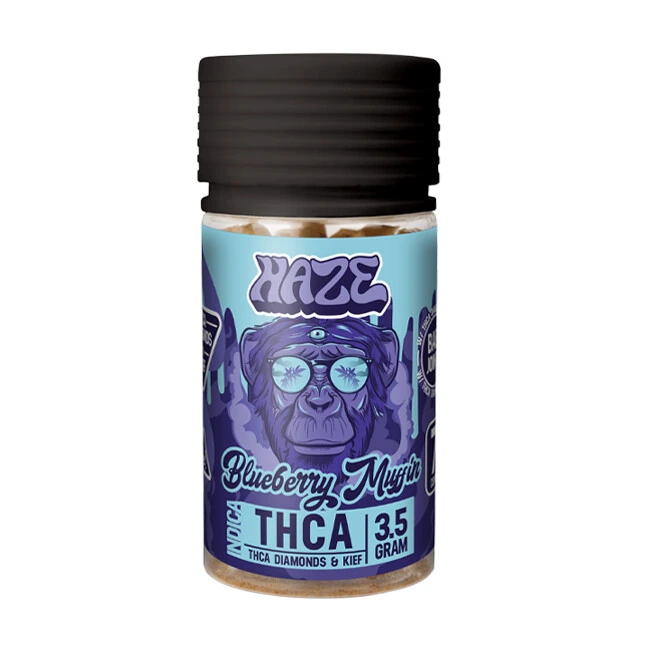
Buy it here: Blueberry Muffin Pre-Roll
First off, the Blueberry Muffin pre-roll was a treat for my senses. I absolutely loved the flavor – it was sweet and fruity, just like biting into a muffin, with a nice earthy undertone. The smoke was smooth, and it really helped me relax after a long day. The high was calming but not overwhelming, perfect for chilling on the couch. The only downside? It burned a bit faster than I expected, so I had to keep an eye on it to make sure I didn’t miss out on any of the goodness.
Haze Pre-Roll – Cereal Milk (3.5g)
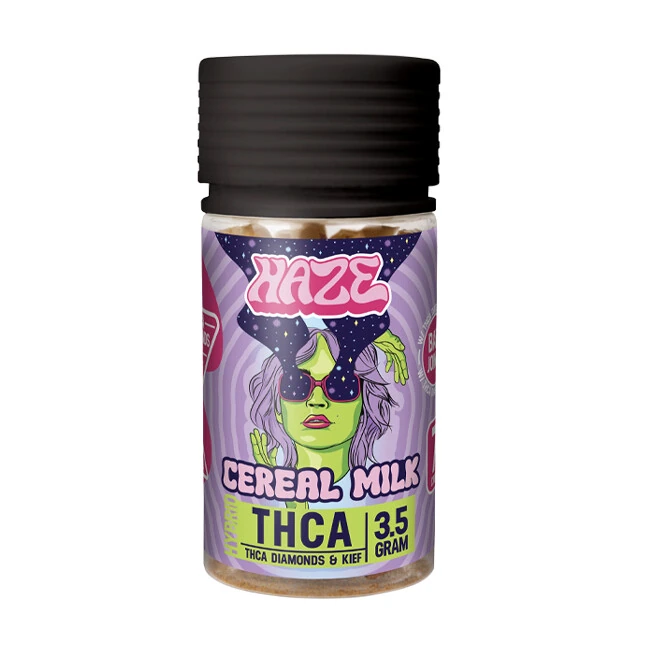
Buy it here: Cereal Milk Pre-Roll
The Cereal Milk pre-roll was another flavor that I just had to try, and it didn’t disappoint. If you’re into sweet, nostalgic flavors, this one will hit you right in the childhood memory banks – think sugary milk after a bowl of cereal. The high was more energizing compared to the Blueberry Muffin, which made it a great choice for daytime use. However, it didn’t have the same smooth burn. I felt like it could’ve been a little more consistent, but still enjoyable overall.
Haze Pre-Roll – Maui Wowie (3.5g)
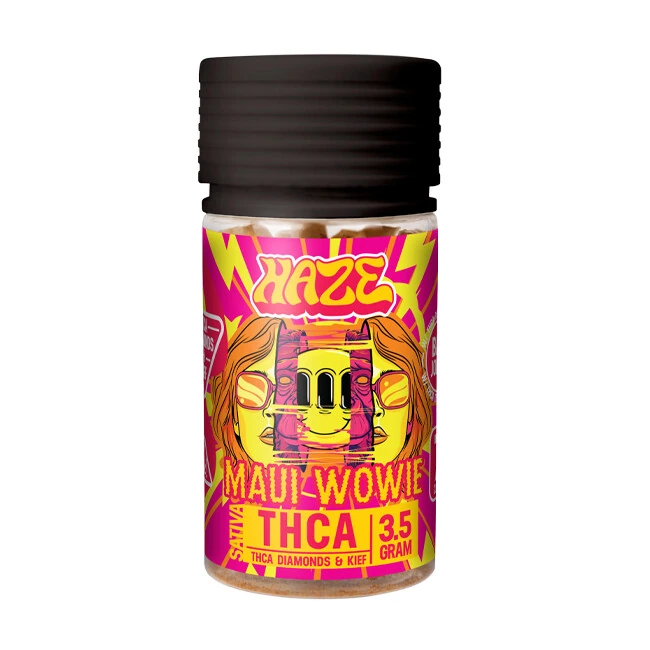
Buy it here: Maui Wowie Pre-Roll
The Maui Wowie pre-roll was hands-down my favorite. It had that classic tropical vibe that you’d expect from the name, with a light, refreshing taste that was almost like a mix of pineapple and floral notes. The high was uplifting, with a nice heady buzz that gave me that euphoric, beachy feeling. This one was perfect for a social situation, or just to boost my mood during the day. A solid winner in my book.
Meditation Blend Live Resin Disposable Vape – Hawaiian Haze (3g)
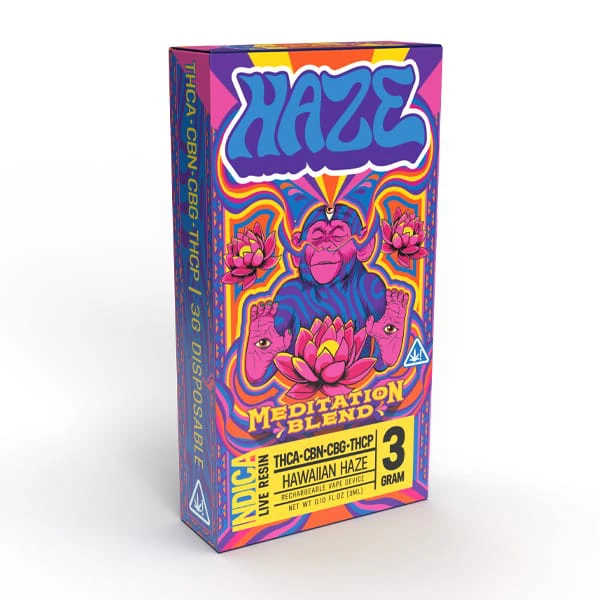
Buy it here: Hawaiian Haze Disposable Vape
I’ve been a fan of live resin vapes for a while, and the Meditation Blend Live Resin Disposable Vape in Hawaiian Haze is one of my go-to options. The flavor was rich and tropical, very smooth on the inhale, and the vapor was easy to puff on without any harshness. The high was more of a mellow body relaxation, but it didn’t leave me feeling too couch-locked. I loved it for a chill evening but still being able to stay mentally sharp. The only thing I wasn’t crazy about was the disposable aspect – I prefer something more sustainable, but hey, the convenience is hard to beat.
Haze Brain Stew Delta-9 Gummies (Hybrid)
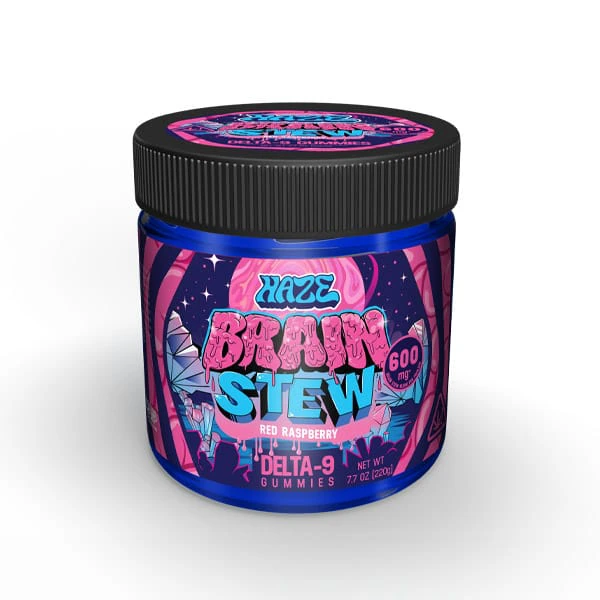
Buy it here: Brain Stew Delta-9 Gummies
These Brain Stew Delta-9 Gummies are absolutely delicious! They have this tangy, slightly sour flavor that’s super easy to enjoy, and each gummy hits that perfect balance between euphoria and relaxation. I love how consistent they are – each gummy has the same potency, so I know exactly what I’m getting every time. The hybrid blend made me feel uplifted but also relaxed, making it ideal for unwinding after work. I did wish they had a bit more of a kick, but they were still solid.
Final Thoughts
In general, these products from Just Delta have really impressed me. If you’re into a smooth, flavorful experience with a mix of calming and energizing effects, these are great choices. The pre-rolls are fun for those who want a more traditional, smokeable experience, while the vape and gummies offer an easy, flavorful alternative.
What are the main benefits of THC consumption?
THC, or tetrahydrocannabinol, is the primary psychoactive compound in cannabis. Its benefits can include pain relief, improved appetite, reduced nausea, and anxiety relief. THC is commonly used for medical purposes, such as managing chronic pain, insomnia, and symptoms of conditions like multiple sclerosis or cancer treatments. However, the effects can vary between individuals.
Can THC improve mental health?
Some individuals find that THC can help manage mental health conditions like anxiety, depression, or PTSD. It may promote relaxation and temporary relief from stress. However, it’s important to note that THC can have different effects on mental health, and in some cases, it may exacerbate anxiety or cause paranoia, especially at high doses.
What are the risks of consuming THC?
While THC offers several therapeutic benefits, it can also come with risks. These include impaired cognitive function, memory issues, and decreased motor skills, especially with higher doses. Long-term or heavy use may also lead to mental health issues, such as increased risk of anxiety or depression, and in rare cases, it may trigger psychotic episodes in vulnerable individuals.
Is THC legal everywhere?
The legality of THC varies significantly by country and region. In some places, THC is fully legal for medical or recreational use, while in others, it remains illegal or is only permitted for specific medical conditions. Always check local laws before consuming THC, as legal consequences can occur if it’s not permitted in your area.
How does THC affect sleep?
THC can be effective in promoting sleep, particularly for individuals suffering from insomnia or related disorders. It may help users fall asleep faster and improve the quality of sleep by reducing interruptions throughout the night. However, the effects may vary from person to person, and overuse could potentially disrupt the sleep cycle over time.
Can THC be used for pain management?
Yes, THC is often used for pain management. It is particularly useful for chronic pain conditions, such as arthritis, migraines, or back pain. THC interacts with the body’s endocannabinoid system to reduce pain and inflammation. However, the effectiveness can depend on the individual and the type of pain being treated.
Does THC have any effect on memory?
THC can impair short-term memory while it is active in the body, especially at higher doses. This can make it harder to remember recent events or focus on tasks. These effects are usually temporary and wear off as the THC leaves the system. However, prolonged use of THC may have more lasting effects on memory and cognition.
How does THC interact with other medications?
THC can interact with certain medications, particularly those that affect the central nervous system, like antidepressants, sedatives, or painkillers. It may enhance or diminish the effects of these medications, leading to either stronger side effects or reduced efficacy. Always consult with a healthcare professional before combining THC with other medications.
Are there any long-term health risks with THC?
Long-term THC use can lead to issues like dependence, memory impairment, and changes in brain structure, particularly with heavy or chronic use starting at a young age. It may also increase the risk of mental health conditions like anxiety or psychosis, especially in those with a family history of such disorders.
Can THC be used recreationally without risks?
While many people use THC recreationally without experiencing major issues, there are still risks, particularly with high doses or frequent use. These risks can include impaired judgment, coordination issues, and the potential for addiction or mental health problems. It’s essential to consume THC responsibly and be aware of personal limits.
- Mississippi’s Leading THC Beverage Brands - June 5, 2025
- Virginia’s THC Infused Beverage Hotspots - May 30, 2025
- Explore THC Infused Seltzers in Hawaii - May 28, 2025






